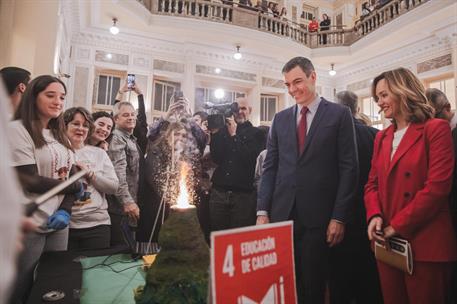Council of Ministers
The Government of Spain raises the Minimum Interprofessional Wage by 50 euros a month
Council of Ministers - 2025.2.11
Moncloa Palace, Madrid
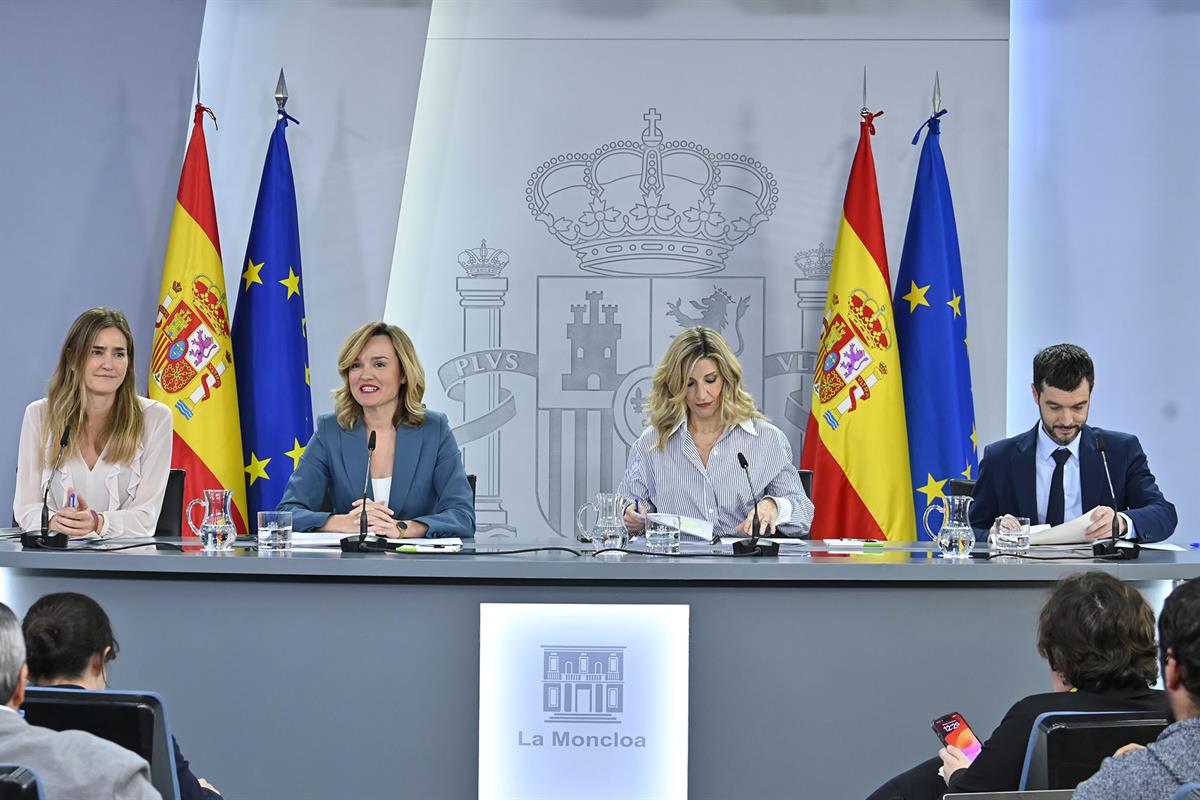 Ministers Sara Aagesen, Pilar Alegría, Yolanda Díaz and Pablo Bustinduy appear at the press conference after the Council of Ministers (Pool Moncloa/José Manuel Álvarez)
Ministers Sara Aagesen, Pilar Alegría, Yolanda Díaz and Pablo Bustinduy appear at the press conference after the Council of Ministers (Pool Moncloa/José Manuel Álvarez)
The Council of Ministers has set the Minimum Interprofessional Wage (SMI) for 2025 at €1,184 per month in 14 payments. The minimum pay received by a worker in Spain is being increased by 50 euros per month and 700 euros per year. The measure, implemented with retroactive effect from 1 January this year, benefits almost 2.5 million workers.
The Second Vice-President of the Government of Spain and Minister for Work and Social Economy, Yolanda Díaz, thanked the social partners for their work in negotiating the increase, agreed with the Comisiones Obreras and UGT trade unions.. Díaz also praised the contributions made by the Advisory Commission for the Analysis of the Minimum Interprofessional Wage (SMI). In her department," she stressed, "all decisions are taken in the light of experts and science.
With the increase approved today, the minimum wage (SMI) has risen by 61% since 2018, which is €6,273 more per year. "We are talking, I know, about very small amounts, but they are very important for families who have nothing," said Yolanda Díaz, who argued that this development has reduced inequality by 18%.
Women and young people benefit most from the increase in the minimum wage
By autonomous communities, Andalusia, Madrid, Catalonia and Valencia are the ones with the highest number of beneficiaries of the SMI increase. In relative terms, Extremadura, the Canary Islands, Murcia and Andalusia have the highest percentage of wage earners who will see their salaries increase.
The Minister for Work and Social Economy described the increase in the minimum wage as "a feminist tool par excellence", as 65.8% of recipients are women, while 34.2% are men. Díaz also highlighted the gender gap in this area: while the percentage of men receiving the SMI is 8.5%, the percentage of women is 17.6%.
The second group to benefit most from the increase in the minimum wage is young people, as more than a quarter of the recipients are under 25 years of age. By productive sector, the measure has a particular impact on agriculture and services.
The rise in the minimum wage "is not only not a threat to our country, it is what makes it move in the right direction", said Díaz, who advocated "putting the focus" on the inequality generated by the "excessive" remuneration received by company boards of directors.
 The Second Vice-President of the Government of Spain and Minister for Work and Social Economy, Yolanda Díaz, at the press conference after the Council of Ministers | Pool Moncloa/José Manuel Álvarez
The Second Vice-President of the Government of Spain and Minister for Work and Social Economy, Yolanda Díaz, at the press conference after the Council of Ministers | Pool Moncloa/José Manuel Álvarez
Reform of the Dependency and Disability laws
The Minister for Social Rights, Consumer Affairs and 2030 Agenda, Pablo Bustinduy, has presented the draft bill to reform the Law for the Promotion of Personal Autonomy and Care for People in a Situation of Dependency, and the General Law on the Rights of Persons with Disabilities and their Social Inclusion, which strengthens the dependency system and extends it so more people can be attended to. The bill will soon return to the Council of Ministers, which will then pass it to the Lower House of Parliament for parliamentary processing.
Pablo Bustinduy reiterated that the aim is to "move towards a model that allows people to remain at home, in their neighbourhood, in their town, in their cities and in their environment for as long as they wish, with the necessary support and services to be able to maintain levels of well-being and quality of life within a public and universal care provision system".
One of the main new features is the elimination of the incompatibility between the different benefits and the two-year suspension period for economic benefits for care in the family environment.
Approval of new rights
The future law will include regulatory changes to guarantee more rights for people in situations of dependency or with disabilities and will expand the catalogue of services for which they are eligible.
The minister announced that he recognises telecare as a universal right for all people in a situation of dependency who live at home: "We want there to be universal coverage of telecare guaranteed throughout the state and also enshrine the enforceable right to universal accessibility, as required by Article 49 of the Constitution.
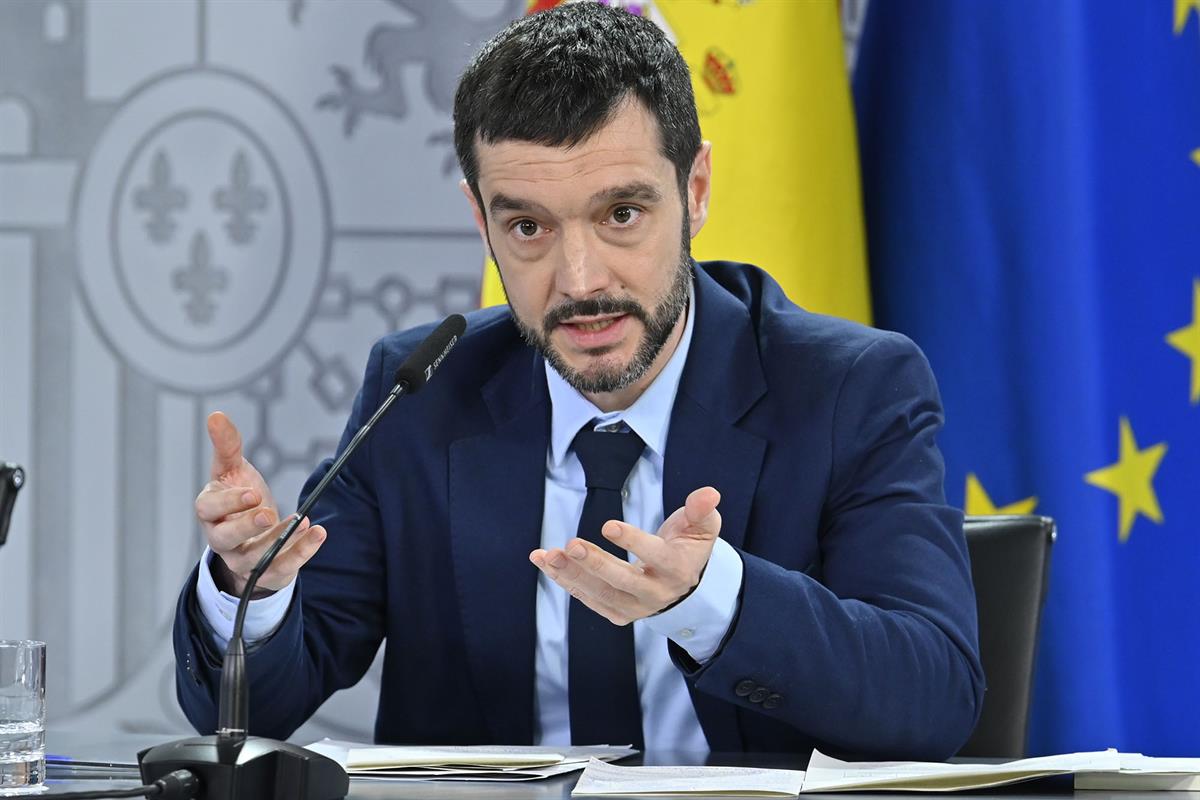 The Minister for Social Rights, Consumer Affairs and 2030 Agenda, Pablo Bustinduy, during his speech at the press conference after the Council of Ministers | Pool Moncloa/José Manuel Álvarez
The Minister for Social Rights, Consumer Affairs and 2030 Agenda, Pablo Bustinduy, during his speech at the press conference after the Council of Ministers | Pool Moncloa/José Manuel Álvarez
In this regard, the reform of the disability law includes measures to make this right to accessibility a reality, such as the creation of a state fund that will finance the actions needed to make all public spaces and services accessible.
In the private sphere, the regulation incorporates an amendment to the Horizontal Property Law to oblige administrations to undertake accessibility works in buildings and dwellings.
Expansion of the benefits catalogue
Pablo Bustinduy announced that the bill broadens the scope of home help to include everyday activities that have not been covered until now, such as accompanying the dependent person to the doctor, to the day centre or shopping. It also incorporates the possibility of collectively organising home help services for people living in the same dwelling, in cohousing or in rural areas.
The minister also indicated that personal assistance will be included as a service in the catalogue and not only as a financial benefit, as was the case until now. And the economic benefits for care in the family environment are extended so that not only family members, but also close relatives, cohabitants or neighbours who undertake the care tasks of a person in a situation of dependency can be beneficiaries of these benefits.
Administrative streamlining and combating discrimination
The reform will simplify some administrative formalities in order to streamline procedures for applying for benefits and will establish a direct gateway so that people who are granted any degree of dependency are recognised as having a degree of disability of 33%.
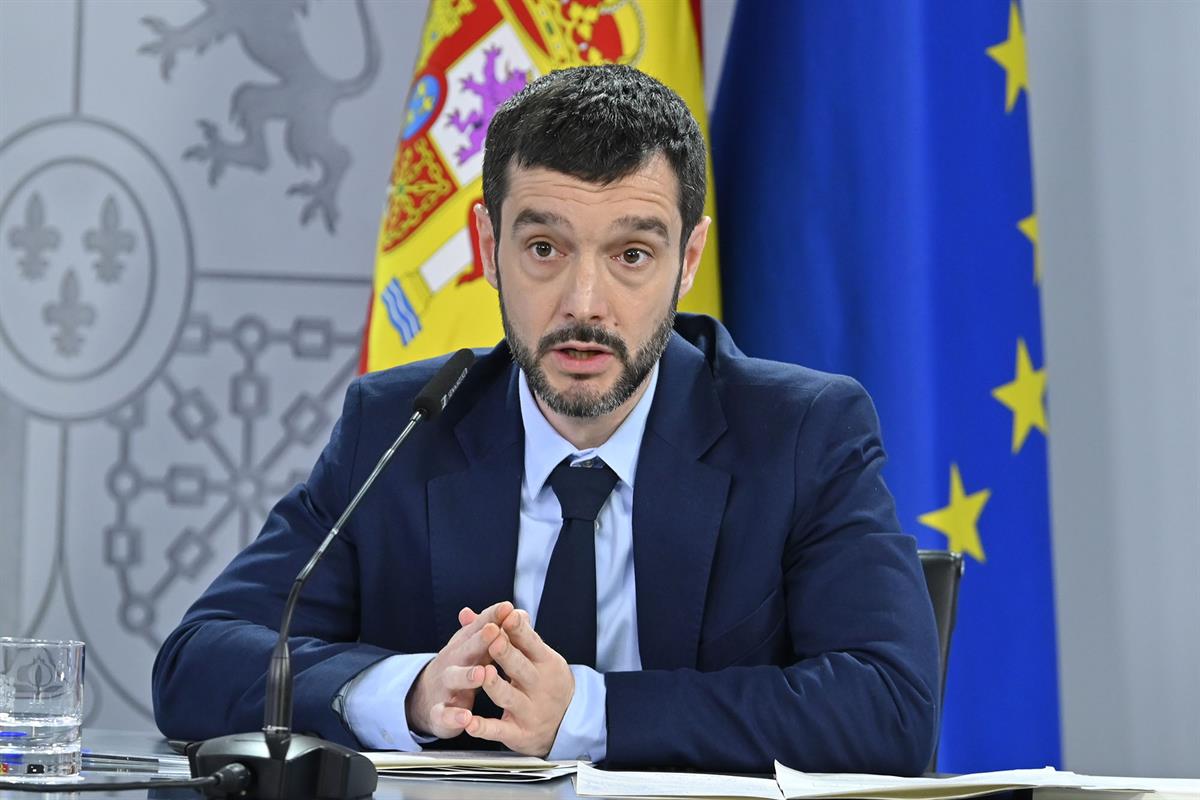 Pablo Bustinduy at the press conference after the Council of Ministers | Pool Moncloa/José Manuel Álvarez
Pablo Bustinduy at the press conference after the Council of Ministers | Pool Moncloa/José Manuel Álvarez
Bustinduy also stressed that measures are included to combat discrimination against people with disabilities, for example, in taking out insurance, and to prevent new technologies from developing discriminatory biases towards these people.
Unprecedented funding effort
The minister stressed that the reform presented today "is ambitious and extraordinarily positive for the change in the care model and is accompanied by an unprecedented funding effort: "In 2024, the General State Administration (AGE) provided €3.411 billion in funding for the dependency system, this is an all-time high, it is 150% more than in 2018 and 200% more than in 2014."
In 2024, he added, "despite the budget rollover, the contribution of the National Government increased by €213 million, and we also completed the transfers to the autonomous communities of component 22 of the Recovery, Transformation and Resilience Plan, of the European funds which, in a pioneering manner, Spain decided to dedicate to the care economy".
Demolition of the illegal hotel on the beach of El Algarrobico
The Government has approved two "extraordinary" measures to protect the environment, according to the Third Vice-President of the Government of Spain and Minister for Ecological Transition and Demographic Challenge, Sara Aagesen.
Firstly, it has initiated the process to demolish the hotel built on the beach of El Algarrobico, in Carboneras (Almeria), as announced yesterday by the First Vice-President of the Government of Spain and Minister for Treasury, María Jesús Montero. The building sits on land that cannot be developed - according to a Supreme Court ruling - in the Cabo de Gata-Níjar Natural Park.
In particular, the Council agreed a declaration of public utility for the land. Aagesen explained that the process will continue with the urgent occupation agreement and other administrative milestones "until the expropriation and demolition" of a construction that "also affects our reputation as a country" is achieved.
The Third Vice-President described the hotel as a "symbol of accelerated urban development" and "urban planning outrages" against ecosystems which, as well as having environmental value, generate wealth through their contribution to Spain's tourist attraction. Furthermore, the maritime-terrestrial public domain "is fundamental for protecting people against the risk of flooding", she pointed out.
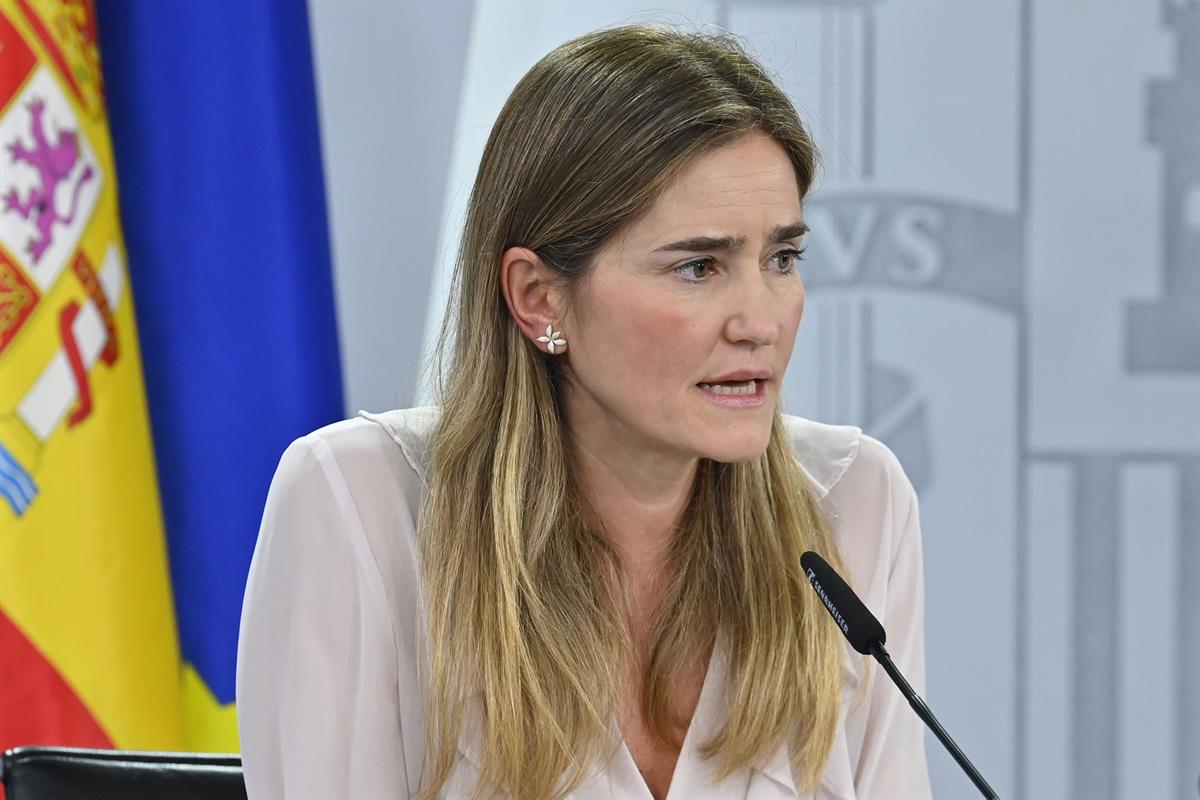 Third Vice-President of the Government of Spain and Minister for Ecological Transition and Demographic Challenge, Sara Aagesen, during her appearance at the press conference after the Council of Ministers | Pool Moncloa/José Manuel Álvarez
Third Vice-President of the Government of Spain and Minister for Ecological Transition and Demographic Challenge, Sara Aagesen, during her appearance at the press conference after the Council of Ministers | Pool Moncloa/José Manuel Álvarez
Aagasen indicated that part of the actions leading to the demolition are the responsibility of the Junta de Andalucía. She also recalled the protocol signed in 2011 by which the Government of Spain and the Junta de Andalucía agreed "clearly and forcefully" who was responsible for the demolition, waste management and restoration of the beach. The Executive has pledged to take care of demolition and waste management, at a cost of up to 7 million euros.
"In this context, it is not enough just to protect, it is essential to restore," said Aagesen, who stressed the importance of the nature restoration law adopted last year at European level. "We are starting with El Algarrobico, we have protected other iconic wetlands and we will act decisively with a nature restoration plan," she said.
Representation and governance of the Mar Menor
Sara Aagesen also announced that the Council of Ministers has regulated the system for the constitution, composition and operation of the representation and governance bodies of the Mar Menor and its basin. This measure allows the effective application of the legal personality of the Mar Menor, the law for which was approved in 2022, and considers this ecosystem as a subject with its own charter of rights, capable of exercising its own rights.
The Minister for Ecological Transition stressed that it was citizens that led this "extraordinarily innovative instrument", a pioneer in Europe. The law, she added, has been recognised internationally by the United Nations as an "important example of progress in the protection of natural ecosystems and advances in the leadership exercised by civil society".
Furthermore, Sara Aagesen remarked that "irresponsible actions" have resulted in the increasing fragility of the ecosystem in this area, where for some time her department has been carrying out numerous actions to restore it.
Appeal against the repeal of the Law of Historical and Democratic Memory of Cantabria
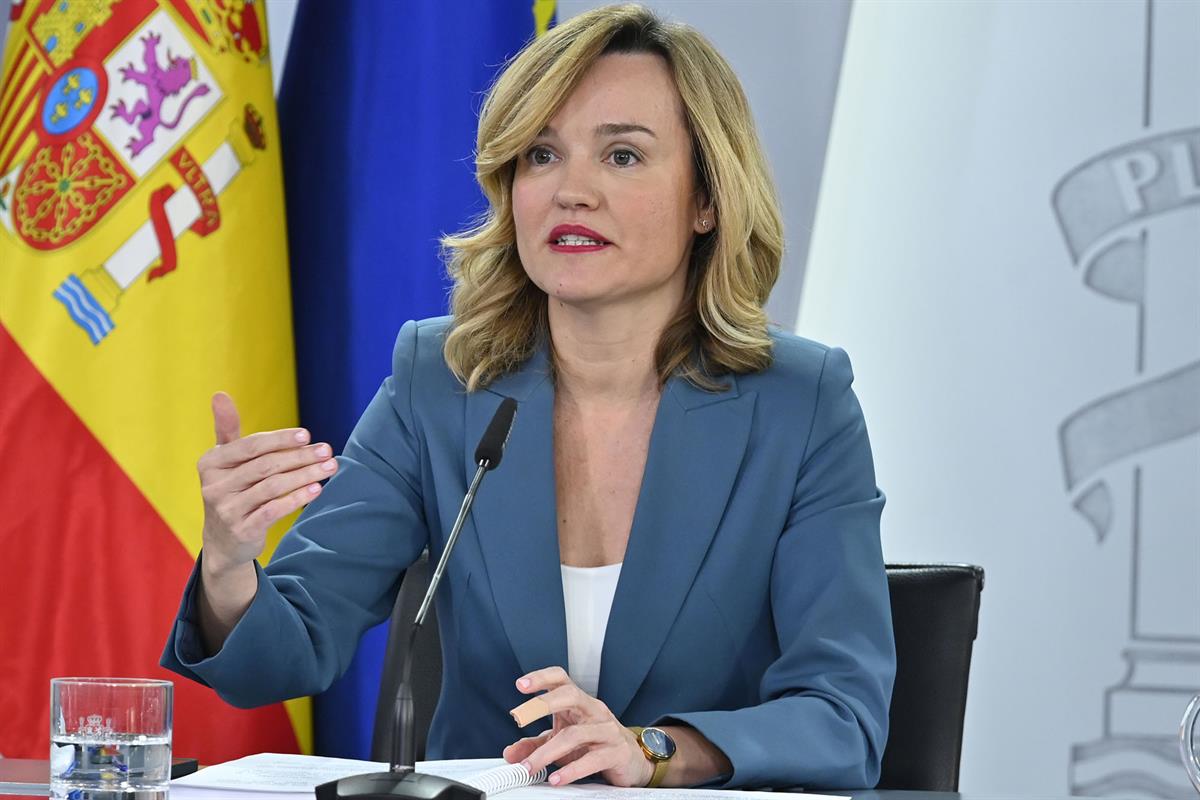 The Minister for Education, Vocational Training and Sports and Government Spokesperson, Pilar Alegría, during her speech at the press conference after the Council of Ministers | Pool Moncloa/José Manuel Álvarez
The Minister for Education, Vocational Training and Sports and Government Spokesperson, Pilar Alegría, during her speech at the press conference after the Council of Ministers | Pool Moncloa/José Manuel Álvarez
The Minister for Education, Vocational Training and Sports and Government Spokesperson, Pilar Alegría, announced that the Council of Ministers has agreed to challenge the Law of Cantabria 1/2024 in the Constitutional Court, a law which repeals the Law of Historical and Democratic Memory of Cantabria.
The spokesperson recalled that the Executive launched the same appeal when the Government of Aragon repealed its Law of Democratic Memory, since "both Cantabria and Aragón rejected the previous possibility of reaching an agreement" to avoid the appeal through dialogue in the Bilateral Cooperation Commission.
International Day of Women and Girls in Science
Pilar Alegría underlined the Government of Spain's commitment to equality between men and women, in the framework of the International Day of Women and Girls in Science. To mark this occasion, the Council of Ministers approved an institutional declaration highlighting the progress achieved in Spain in this area.
"We want to reaffirm our commitment to the need to continue raising the visibility of role models that enable us to awaken vocations and take advantage of all the talent we have in our country, with the fundamental objective of continuing to move towards the full and equal participation of women, also in the field of science, technology and innovation," she concluded.
A "pro-worker" roadmap with "historic figures"
Alegría framed the rise in the minimum wage as part of the roadmap that the government is deploying "in favour of workers and the middle class". According to the spokesperson, the measures approved in this roadmap, among which she highlighted the labour reform, have achieved employment figures that she described as "historic".
"We are talking about more than 21,300,000 people paying Social Security contributions and, in addition, more than 3.6 million permanent contracts have been signed in this country. She also referred to the drive to reduce the working week to 37.5 hours a week and to the accumulated increase over the last few years in pensions and grants.
Non official translation





